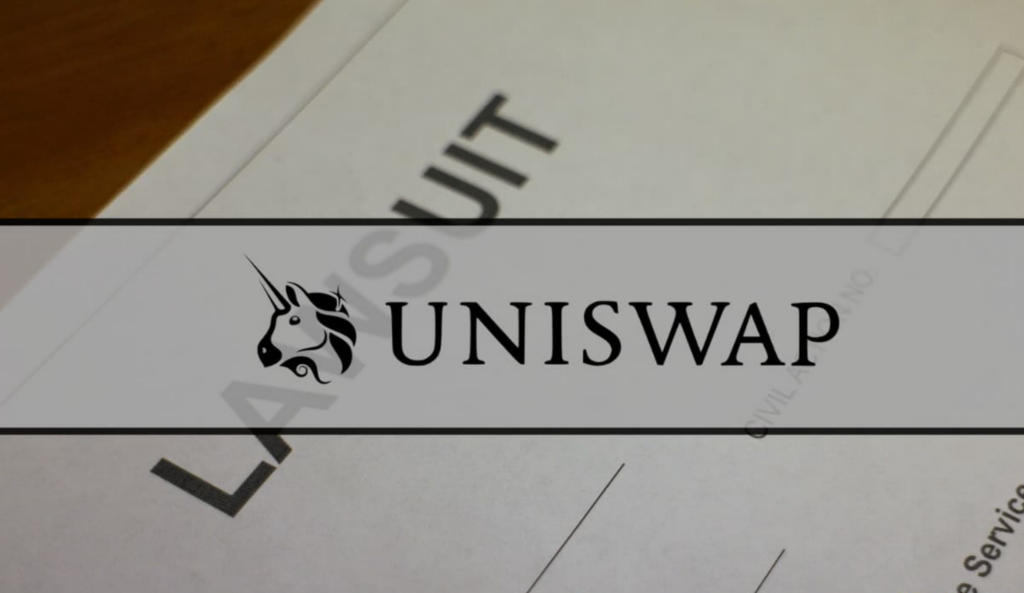In a recent development, a class action lawsuit that was filed against Uniswap, the decentralized exchange protocol, has been dismissed by a judge. Initially brought by the US Securities and Exchange Commission (SEC) against Coinbase, the lawsuit failed to provide sufficient grounds for the case against Uniswap to proceed. The court deemed the plaintiffs’ arguments, based on transfer of title theory and solicitation theory, insufficient. This outcome not only sets a legal precedent for other decentralized entities facing similar allegations but also highlights the need for more precise regulatory frameworks in the cryptocurrency sector. As a result, the dismissal of this lawsuit has the potential to impact investor confidence in decentralized finance (DeFi) platforms.

Uniswap’s Class Action Lawsuit Dismissal: Potential Implications for DeFi Investor Confidence
Background of the Lawsuit
A class action lawsuit filed against Uniswap, a decentralized exchange protocol, has recently been dismissed by a judge. This lawsuit has garnered significant attention in the cryptocurrency community and has raised important questions about the regulatory environment for decentralized finance (DeFi) platforms.
Origins of the Lawsuit
The lawsuit was initially brought by the US Securities and Exchange Commission (SEC) against Coinbase, a leading cryptocurrency exchange. The plaintiffs alleged that Coinbase had violated securities laws by offering unregistered securities to investors. The case against Coinbase was based on the transfer of title theory, which argues that certain cryptocurrencies should be classified as securities.
Involvement of the US Securities and Exchange Commission (SEC)
As the regulatory body responsible for overseeing securities markets in the United States, the SEC has been closely monitoring the cryptocurrency sector. The agency has expressed concerns about the lack of regulatory oversight in the industry and has taken action against companies that it believes have violated securities laws.
Initial Lawsuit against Coinbase
The SEC’s lawsuit against Coinbase set the stage for the legal battle that unfolded. The plaintiffs argued that Coinbase should be held accountable for offering unregistered securities to investors and sought damages for the alleged violations.
Extension of the Lawsuit to Uniswap
The lawsuit against Uniswap was an extension of the case against Coinbase. The plaintiffs claimed that Uniswap’s decentralized exchange protocol enabled the trading of unregistered securities and should therefore be subject to the same legal scrutiny as Coinbase.
The Dismissal Decision
Judge’s Ruling
The judge, in the dismissal ruling, found no grounds to proceed with the case against Uniswap. The judge’s decision was based on a careful evaluation of the arguments raised by the plaintiffs and an examination of the unique decentralized structure of Uniswap.
Lack of Grounds to Proceed
The dismissal of the lawsuit can be attributed to the lack of sufficient evidence to support the plaintiffs’ claims against Uniswap. The court concluded that Uniswap’s decentralized exchange protocol did not facilitate the trading of securities and therefore did not violate securities laws.
Implications of the Dismissal
The dismissal of the lawsuit has significant implications for the decentralized finance sector. It establishes a legal precedent that decentralized entities, such as Uniswap, may not necessarily be subject to traditional securities regulations. This could pave the way for other decentralized platforms to operate without the fear of facing similar legal challenges.

Arguments Raised by the Plaintiffs
Transfer of Title Theory
The plaintiffs’ arguments were based on the transfer of title theory, which contends that certain cryptocurrencies should be considered securities because they represent ownership interests in a project or company. The plaintiffs claimed that by enabling the trading of these cryptocurrencies, Uniswap was effectively facilitating the trading of securities.
Solicitation Theory
The plaintiffs also raised the solicitation theory, which argues that by listing certain tokens on its platform, Uniswap was engaging in activities that constituted the solicitation of securities offerings. This theory is based on the idea that platforms like Uniswap play an active role in connecting buyers and sellers of tokens.
Court’s Assessment of the Arguments
The court carefully evaluated the plaintiffs’ arguments and ultimately found them to be without merit. The court ruled that the transfer of title theory did not apply in this case because Uniswap’s protocol did not confer ownership rights over the traded tokens. Additionally, the court determined that the solicitation theory did not hold up because Uniswap’s listing of tokens did not constitute a solicitation of securities offerings.
Reasons for Dismissal
Based on its assessment of the arguments raised by the plaintiffs, the court concluded that there were no valid grounds to proceed with the case against Uniswap. The court’s dismissal decision underscores the unique nature of decentralized exchange protocols like Uniswap and the need for a tailored regulatory approach.
Challenges Faced by the Plaintiffs
Unique Decentralized Structure of Uniswap
One of the main challenges faced by the plaintiffs was the unique decentralized structure of Uniswap. Unlike traditional centralized exchanges, Uniswap operates on a decentralized blockchain network and does not have a central authority that can be held accountable for any alleged violations of securities laws. This made it difficult for the plaintiffs to establish legal liability.
Vague Regulatory Environment for Cryptocurrencies
The regulatory environment surrounding cryptocurrencies is still in its nascent stages and remains largely undefined. This lack of clarity posed challenges for the plaintiffs as they tried to navigate the legal landscape and build a case against Uniswap. Without clear regulations specific to decentralized finance platforms, the plaintiffs had difficulty demonstrating that Uniswap’s activities constituted a violation of existing securities laws.
Difficulties in Establishing Jurisdiction
Another hurdle faced by the plaintiffs was the difficulty in establishing jurisdiction. Cryptocurrencies and decentralized finance platforms operate on a global scale, making it challenging to determine the appropriate jurisdiction for legal proceedings. This complexity added to the challenges faced by the plaintiffs as they sought to bring their case against Uniswap.
Impact on Other Decentralized Entities
Legal Precedent Set by the Dismissal
The dismissal of the lawsuit against Uniswap sets an important legal precedent for other decentralized entities facing similar allegations. It establishes that decentralized exchange protocols may not be subject to the same regulatory requirements as traditional securities exchanges, provided they do not facilitate the trading of securities.
Similar Allegations Faced by Decentralized Entities
Decentralized entities across the cryptocurrency sector have faced similar allegations of facilitating the trading of unregistered securities. The dismissal of the lawsuit against Uniswap could potentially influence the outcomes of these other cases. It provides a strong argument for decentralized platforms to defend themselves against claims that they are operating in violation of securities laws.
Potential Challenges and Opportunities for Other Entities
While the dismissal of the lawsuit is a positive outcome for Uniswap, it may present both challenges and opportunities for other decentralized entities. On one hand, the dismissal sets a legal precedent that could strengthen the defense strategies of similar entities facing legal challenges. On the other hand, it could also prompt regulators to reevaluate their approach to regulating decentralized finance platforms and potentially introduce more tailored regulations.
Potential for Regulatory Frameworks
Need for Tailored Regulations
The dismissal of the lawsuit against Uniswap highlights the need for tailored regulatory frameworks for the cryptocurrency sector, particularly decentralized finance platforms. The current regulatory landscape does not adequately address the unique features and challenges posed by decentralized platforms. Tailored regulations would provide greater clarity for market participants and help mitigate legal risks.
Emerging Discussions on Regulatory Frameworks
The dismissal of the lawsuit against Uniswap could serve as a catalyst for emerging discussions on regulatory frameworks for decentralized finance platforms. Regulators and industry stakeholders may use this opportunity to engage in constructive dialogues on developing regulations that strike a balance between fostering innovation and ensuring investor protection.
Role of the Lawsuit in Shaping Future Regulations
The outcome of the lawsuit against Uniswap may have a lasting impact on the development of regulatory frameworks for the cryptocurrency sector. The dismissal of the lawsuit reinforces the need for regulators to carefully consider the unique characteristics of decentralized finance platforms and develop regulations that appropriately address their activities. This could lead to a more comprehensive and tailored regulatory framework that promotes innovation while safeguarding investor interests.

Implications for the Cryptocurrency Sector
Increased Scrutiny and Clarity
The dismissal of the lawsuit against Uniswap could lead to increased scrutiny and clarity in the cryptocurrency sector. Regulators may intensify their efforts to better understand and regulate decentralized finance platforms. This heightened scrutiny could result in clearer guidelines and regulations that provide market participants with a clearer understanding of their obligations and legal risks.
Possible Shift in Regulatory Approach
The dismissal of the lawsuit against Uniswap may also signal a potential shift in the regulatory approach towards decentralized finance platforms. Regulators may recognize the unique characteristics of these platforms and work towards developing regulations that foster innovation while effectively addressing investor protection concerns. This shift in approach could have far-reaching implications for the cryptocurrency sector as a whole.
Impact on the Overall Industry Landscape
The dismissal of the lawsuit against Uniswap could impact the overall industry landscape by paving the way for the continued growth and development of decentralized finance platforms. With the legal precedent set by this case, decentralized entities may have more confidence in their operations and attract more users and investors. This, in turn, could drive further innovation and adoption of decentralized finance solutions.
Influence on Investor Confidence
Significance of Investor Confidence
Investor confidence plays a crucial role in the success and growth of the decentralized finance sector. Confidence in the integrity and legality of platforms like Uniswap is paramount for attracting and retaining investors. The outcome of the lawsuit against Uniswap may have a significant influence on investor sentiment towards decentralized finance platforms.
Lawsuit Outcome’s Effect on Investor Sentiment
The dismissal of the lawsuit against Uniswap could have a positive effect on investor sentiment. The legal victory for Uniswap reinforces the notion that decentralized finance platforms can operate within the boundaries of the law. This could increase investor confidence in these platforms and encourage greater participation in decentralized finance activities.
Factors Influencing Investor Confidence in DeFi
Investor confidence in decentralized finance platforms is influenced by several factors. These include regulatory clarity, transparency of operations, the security of funds, and the track record of the platform. The outcome of the lawsuit against Uniswap contributes to regulatory clarity and may enhance investor confidence in the sector as a whole.

Conclusion
Summary of the Lawsuit Dismissal
The dismissal of the class action lawsuit against Uniswap is a significant development in the legal landscape of the cryptocurrency sector. The judge’s ruling emphasized the unique nature of decentralized exchange protocols and the need for tailored regulatory frameworks. The dismissal also underscores the challenges faced by the plaintiffs in establishing legal liability.
Considerations for Decentralized Entities
The dismissal of the lawsuit sets a legal precedent that may benefit other decentralized entities facing similar legal challenges. It highlights the importance of considering the unique characteristics of decentralized platforms and the need for tailored regulations. Decentralized entities can use this dismissal as a defense against claims of securities law violations.
Future Outlook for DeFi and Investor Confidence
The dismissal of the lawsuit against Uniswap has the potential to shape the future regulatory landscape for decentralized finance platforms. It could lead to more tailored regulations that strike a balance between fostering innovation and ensuring investor protection. This could increase investor confidence in decentralized finance platforms and facilitate further growth and adoption in the sector.















